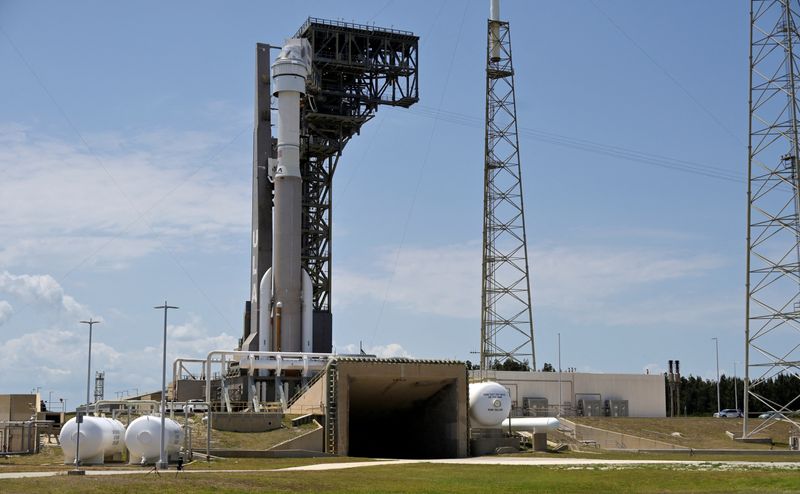(This May 7 story has been corrected to fix the cumulative spaceflight time logged by the two astronauts to 500 days, instead of 500 hours, in paragraph 7)
By Steve Gorman
(Reuters) - The Atlas (NYSE:ATCO) V rocket carrying Boeing (NYSE:BA) Co's new Starliner space capsule will be rolled back to its hangar to replace a pressure valve, postponing the long-awaited first crewed test flight of the spacecraft for at least 10 more days, NASA said on Tuesday.
The new targeted launch date for the mission - pivotal to Boeing's struggle to acquire a greater share of lucrative NASA business now dominated by Elon Musk's SpaceX - has been set for May 17 at the earliest, according to NASA.
The debut flight of the CST-100 Starliner with astronauts aboard was originally scheduled for liftoff on Monday night from NASA's Kennedy Space Center at Cape Canaveral, Florida, on a voyage to the International Space Station (ISS).
But the launch was called off with less than two hours left in the countdown after a pressure regulation valve malfunctioned on the upper-stage liquid oxygen tank of the Atlas rocket as it was being readied for blastoff.
The rocket, a separate component from the Starliner capsule, is furnished and operated by United Launch Alliance (ULA), a Boeing-Lockheed Martin joint venture.
Once launched, the gumdrop-shaped capsule and its two-astronaut crew are expected remain docked to the space station for about a week before returning to Earth in a parachute- and airbag-assisted landing in the U.S. Desert Southwest.
Selected to ride aboard Starliner on its first crewed run, and to operate its manual controls, were two veteran NASA astronauts with 500 days of spaceflight between them - Barry "Butch" Wilmore, 61, and Sunita "Suni" Williams, 58.
After Monday night's aborted launch attempt, NASA, Boeing and ULA announced that they would seek to try again as early as Friday, May 10.
But in an update posted Tuesday evening, NASA said more time was needed after ULA "decided to remove and replace" the pressure valve, whose irregular fluctuations appeared to be beyond adjustment. That will require the rocket to be rolled back to its vertical integration facility on Wednesday for repairs, leak checks and other reviews ahead of a second launch attempt, NASA said.
Those operations pushed the potential launch date back at least another week from the earlier target, NASA said.
The crewed space launch comes two years after the Starliner completed its first test flight to the orbital laboratory without humans aboard. The Starliner's first uncrewed flight to the ISS in 2019 ended in failure.
Boeing has faced intense public scrutiny of all its activities after a series of safety failures that have staggered its commercial airplane operations, including the mid-air blowout of a jetliner door plug in January.

The company has been eager to get its Starliner space venture off the ground to show signs of success and redeem a program years behind schedule, and with more than $1.5 billion in cost overruns.
While Boeing has struggled, SpaceX has become a dependable taxi to orbit for NASA, which is backing a new generation of privately built spacecraft to ferry astronauts to the ISS and, under the space agency's more ambitious Artemis program, to the moon and eventually Mars.